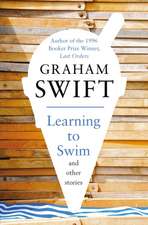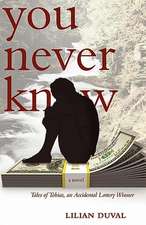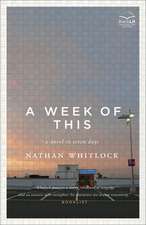Tomorrow
Autor Graham Swiften Limba Engleză Paperback – 31 aug 2008
Recalling the years before and after her children were born, Paula begins a story that is both a glowing celebration of love possessed and a moving acknowledgment of the secrets on which our very identities rest. Brilliantly distilling half a century into one suspenseful night, Tomorrow is an eloquent meditation on the mystery of happiness.
Preț: 84.32 lei
Nou
Puncte Express: 126
Preț estimativ în valută:
16.14€ • 16.67$ • 13.43£
16.14€ • 16.67$ • 13.43£
Carte indisponibilă temporar
Doresc să fiu notificat când acest titlu va fi disponibil:
Se trimite...
Preluare comenzi: 021 569.72.76
Specificații
ISBN-13: 9780307386434
ISBN-10: 0307386430
Pagini: 255
Dimensiuni: 130 x 201 x 23 mm
Greutate: 0.3 kg
Editura: Vintage Books USA
ISBN-10: 0307386430
Pagini: 255
Dimensiuni: 130 x 201 x 23 mm
Greutate: 0.3 kg
Editura: Vintage Books USA
Notă biografică
Graham Swift lives in London and is the author of seven previous novels: The Sweet-Shop Owner; Shuttlecock, which received the Geoffrey Faber Memorial Prize; Waterland, which was shortlisted for the Booker Prize and won the Guardian Fiction Award, the Winifred Holtby Memorial Prize, and the Italian Premio Grinzane Cavour; Out of This World; Ever After, which won the French Prix du Meilleur Livre Étranger; Last Orders, which was awarded the Booker Prize; and, most recently, The Light of Day. He is also the author of Learning to Swim, a collection of short stories. His work has been translated into more than thirty languages.
Extras
Chapter One
You're asleep, my angels, I assume. So, to my amazement and relief, is your father, like a man finding it in him to sleep on the eve of his execution. He'll need all he can muster tomorrow. I'm the only one awake in this house on this night before the day that will change all our lives. Though it's already that day: the little luminous hands on my alarm clock (which I haven't set) show just gone one in the morning. And the nights are short. It's almost midsummer, 1995. It's a week past your sixteenth birthday. By a fluke that's become something of an embarrassment and that some people will say wasn't a fluke at all, you were born in Gemini. I'm not an especially superstitious woman. I married a scientist. But one little thing I'll do tomorrow—today, I mean, but for a little while still I can keep up the illusion—is cross my fingers.
Everything's quiet, the house is still. Mike and I have anticipated this moment, we've talked about it and rehearsed it in our heads so many times that recently it's sometimes seemed like a relief: it's actually come. On the other hand, it's monstrous, it's outrageous—and it's in our power to postpone it. But "after their sixteenth birthday," we said, and let's be strict about it. Perhaps you may even appreciate our discipline and tact. Let's be strict, but let's not be cruel. Give them a week. Let them have their birthday, their last birthday of that old life.
You're sleeping the deep sleep of teenagers. I just about remember it. I wonder how you'll sleep tomorrow.
Sixteen was old enough, sixteen was about right. You're not kids any more, you'd be the first to endorse that. And even in the last sixteen years, you could say, sixteen's become older. Sixteen now is like eighteen was, sixteen years ago. There's an acceleration, an upgrading to things that scare me, but seem hardly to touch you. 1995—already. I'll be fifty in August, I'll have done my annual catching up with your father. What a year of big numbers. Fifty, of course, is nothing now, it's last season's forty. Life's getting longer, more elastic. But that doesn't stop the years getting quicker, this feeling that the world is hurtling.
Perhaps you don't feel it, in your becalmed teenage sleep. Perhaps you want the world to hurtle. Come on, can't it go any faster? Perhaps what all parents want from their children is to feel again that deep, long, almost stationary slowness of time. Another sweet taste of it, please.
But sixteen years have passed and sixteen's like eighteen once was, maybe. But that doesn't matter. To me, tonight, you're still little kids, you're tiny babies, as if you might be sleeping now, not in your separate dens of rooms, but together as you once did in a single cot at Davenport Road. Our Nick and Kate. And what I'm feeling now is simply the most awful thing: that we might be wrenching you for ever from your childhood, in the same way as if you might have been wrenched once prematurely and dangerously from my womb. But you were right on time: the tenth of June 1979. And at two, as it happens, in the morning.
Mike will do the talking. He knows, he accepts that it's up to him. On a Saturday, knowing you both, the morning will be half gone before you even appear for breakfast, and you'll need your breakfast. Then Mike will say that we need to talk to you. He'll say it in an odd, uncasual way, and you'll think twice about answering back. No, right now, please. Whatever other plans you had, drop them. There'll be something in his voice. He'll ask you to sit in the living room. I'll make some fresh coffee. You'll wonder what the hell is going on. You'll think your father's looking rather strange. But then you might have noticed that already, you might have noticed it all this week. What's up with Dad? What's up with the pair of them?
As he asks you to sit, side by side, on the sofa (we've even discussed such minor details), you'll do a quick run-through in your minds of all those stories that friends at school have shared with you: inside stories, little bulletins on domestic crisis. It's your turn now, perhaps. It has the feeling of catastrophe. He's about to tell you (despite, I hope, your strongest suppositions) that he and I are splitting up. Something's been going on now for a little while. He's been having an affair with one of those (young and picked by him) women at his office. An Emma or a Charlotte. God forbid. Or I've been having an affair (God forbid indeed) with Simon at Walker's, or with one of our esteemed but importunate clients. Married life here in Rutherford Road is not all it seems. Success and money, they do funny things. So does being fifty.
You're in tune with such under-the-surface stuff from your between-lessons gossip. It's part of your education: the hidden life of Putney.
But then—you're sixteen. Do you notice, these days, that much about us at all? Do you pick up on our moods and secrecies? We've had a few rows in recent weeks, have you actually noticed? And we don't often row. But then, so have you. You're at a stage—don't think I haven't noticed—when that cord, that invisible rope that runs between you has been stretched to its limit. It's been yanked and tugged this way and that. You have your own worlds to deal with.
And you've only just finished your exams. Ordeal enough. This should have been a weekend of recuperation. And if you'd still had more exams to go we'd have stretched our timetable to accommodate them. Let's not ruin their chances, let's not spoil their concentration. Bad enough that your birthday, last weekend, should have been subject to your last bouts of revision. As it is, we've been tempted. Let's wait—till after the results perhaps, till after one more precious summer. But we came back to our firm ruling: one week's cushion only. And since your birthday fell this year, handily, on a Saturday . . . Forgive us, there's more revision. Exams can affect your life. So can this.
Mike will do the talking. I'll add my bits. And, of course, when he's finished he'll make himself open to questions, as many as you wish. To cross-examination, might be the better expression. It all just might, conceivably, go to plan, though I'm not sure what the "plan" really is, apart from our rigorous timing. It might all be like some meeting that smoothly and efficiently accomplishes its purpose, but it can hardly be like one of your dad's board meetings or one of our cursory get-togethers at Walker's: "That was all dealt with at the meeting . . ."
I think, anyway, you'll want to know everything, the full, complete and intricate story. And you deserve it, as a matter of record.
Your father is gently snoring.
I remember once you said to me, Kate: "Tell me about before I was born." Such simply uttered and innocent words: they sent a shiver through me. I should have been delighted, charmed, even a little flattered. You actually had a concept of a time before you were around, a dawning interest in it. You saw it had some magic connection with you, if you still thought of it, maybe, like life on another planet.
How old were you then—eight? We were on the beach in Cornwall, at Carrack Cove, we had those three summers there, this must have been the second. I'd wrapped you in the big faded-blue beach towel and was rubbing you gently dry, and I remember thinking that the towel was no longer like something inside which you could get lost and smothered, you were so much bigger now. And a whole year had passed since the time when, off that same beach, you both quite suddenly learnt to swim. First you, then Nick almost immediately afterwards, like clockwork. One of those first-time and once-only moments of life. But I'd suddenly called you "a pair of shrimps." Why not "fish?" Or "heroes?" I suppose it was the pinkness and littleness. I suppose it was the way you just jerked and scudded around furiously but ecstatically in the shallows, hardly fish-like at all. I didn't want to think of you yet swimming out to sea. Shrimps.
Did you notice the odd look in my eye? A perfectly innocent question, but there was something strange about it. You said, "Before I was born," not "we." Nick was still down at the water's edge with Mike. He came up so much higher against Mike now, and Mike's always been a good, lean height. Did you notice my little teeter? But I would have quickly smiled, I hope. I would have quickly got all wistful and girl-to-girl, if still motherly. I kept on rubbing you and I told you, you'll remember, about another beach, far away in Scotland, where, I said, your daddy "proposed" to me. In a sand dune, in fact.
That was eight years ago. Half your life. I could still dare to wear a bikini. It was one of those many panicky but smoothed-over moments—you'll understand soon what I mean—which have sometimes brought Mike and me to a sort of brink. Why not now? Oh, we've had our jitters. But we've kept to our schedule. It will be up to you, tomorrow, to judge, to tell us if, in the circumstances, you'd have done the same. But what a stupid idea: if you'd have done the same!
You said you'd like to propose to Nick—to practise proposing to Nick. I said it didn't tend to work that way round, and it was a thing, anyway, that belonged to "those old days." And suppose, I said, Nick should say no? My bikini was dark brown, your little costume was tangerine. It's men, I said, if it happens at all now, who do the proposing.
And sometimes the explaining. But I think you both deserve the full story from me, your mother. Mike will give you his story, his version. I mean, it won't be a story, it will be the facts, a story is what you've had so far. All the same, it will be a sort of version of something real. One thing we've learnt in these sixteen years is how hard it can be to tell what's true and what's false, what's real and what's pretend. It's one thing you'll have to decide, unfortunately. Which version is it to be?
At two o'clock in the morning. Of course, we let you know that. A charming little gloss on those facts of life that were bound to get raised sooner or later and can sometimes be (or they could be in those "old days") a cause of awkward Saturday mornings. Though hardly when you were barely three and first put the innocent question and were both completely enchanted, it seemed, to learn that you both came out of my tummy, that you'd both once been there together. And that seemed to be the bit—do you even remember?—that really tickled you pink, that you'd been there together. So much so that though you'd moved by then to your first little separate beds, it seemed to reinforce your obstinate habit of ending up nonetheless in the same one.
One morning I found you like that, trying to form a positive little single ball of clinging, squirming, not to say giggling flesh. And you said you were practising "not being born yet." And making, if it's possible to say so, a pretty good fist of it.
I should have said that it had tickled me pink once that you'd been there together inside me.
As to that other, critical question: how did you get there?—it never came up then. A stage before the stage of not being born yet, that was beyond your reckoning. But you should know that it was our first, unsteady, provisional position: that when it did come up it should be our guide, our testing of the way ahead for the other thing we had to tell you. It should even be, perhaps, the one and the same occasion. Except that when it did come up it was all at my rushing instigation, and you, Kate—this you'll surely remember—took the wind clean out of my sails.
Another girl-to-girl moment like that one about "proposing," and it can't have been so long after. I was the one, not your dad, who suddenly pushed myself to the fore of doing all the explaining. Though I would have started with the standard biology lesson. "Kate, there are some things you need to know . . . about how babies are really born . . ."
God knows what prompted it. Some little look in your eye, which I took as a challenge? Just that speed at which you were growing? What had we been talking about? And you might have let me just stumble on, even topple, still clutching you, over a precipice you were entirely unaware of. And if the truth be known, a sort of gong was banging in my head: Come on, get it over with! But you took the wind from my sails.
"You mean periods and stuff, Mum? You mean what boys have to do with their willies? It's all right, I already know all about that stuff. And don't worry, I've told Nick all about it as well."
How old were you? You seemed so blithely, safely sure of your ground that I no longer wanted to risk mine. And I'm not sure, to this day, if I ever want to intrude on those early biology lessons you would have given Nick. Your eyes met mine perfectly sunnily. Well, that takes care of that, I thought, that takes care of the facts of life and, until further notice, of the other facts that go with them.
It should all, perhaps, have worked the other way round. That happy well-informedness, apparently, of both of you, should only have let Mike and me press on with our full—agenda. But the fact is it was really then that we fell back on our default position: when they are sixteen. You were surely too young, then, for the full agenda. And, on the other hand, if those facts of life really were taken care of and weren't any more like some flashpoint still in store, did we need to hurry towards trouble?
Okay, you'll grasp this, I'm sure: it was to protect us, as well as you, to extend our sweet lease as much as yours. Will you be able to sympathise?
From the Hardcover edition.
You're asleep, my angels, I assume. So, to my amazement and relief, is your father, like a man finding it in him to sleep on the eve of his execution. He'll need all he can muster tomorrow. I'm the only one awake in this house on this night before the day that will change all our lives. Though it's already that day: the little luminous hands on my alarm clock (which I haven't set) show just gone one in the morning. And the nights are short. It's almost midsummer, 1995. It's a week past your sixteenth birthday. By a fluke that's become something of an embarrassment and that some people will say wasn't a fluke at all, you were born in Gemini. I'm not an especially superstitious woman. I married a scientist. But one little thing I'll do tomorrow—today, I mean, but for a little while still I can keep up the illusion—is cross my fingers.
Everything's quiet, the house is still. Mike and I have anticipated this moment, we've talked about it and rehearsed it in our heads so many times that recently it's sometimes seemed like a relief: it's actually come. On the other hand, it's monstrous, it's outrageous—and it's in our power to postpone it. But "after their sixteenth birthday," we said, and let's be strict about it. Perhaps you may even appreciate our discipline and tact. Let's be strict, but let's not be cruel. Give them a week. Let them have their birthday, their last birthday of that old life.
You're sleeping the deep sleep of teenagers. I just about remember it. I wonder how you'll sleep tomorrow.
Sixteen was old enough, sixteen was about right. You're not kids any more, you'd be the first to endorse that. And even in the last sixteen years, you could say, sixteen's become older. Sixteen now is like eighteen was, sixteen years ago. There's an acceleration, an upgrading to things that scare me, but seem hardly to touch you. 1995—already. I'll be fifty in August, I'll have done my annual catching up with your father. What a year of big numbers. Fifty, of course, is nothing now, it's last season's forty. Life's getting longer, more elastic. But that doesn't stop the years getting quicker, this feeling that the world is hurtling.
Perhaps you don't feel it, in your becalmed teenage sleep. Perhaps you want the world to hurtle. Come on, can't it go any faster? Perhaps what all parents want from their children is to feel again that deep, long, almost stationary slowness of time. Another sweet taste of it, please.
But sixteen years have passed and sixteen's like eighteen once was, maybe. But that doesn't matter. To me, tonight, you're still little kids, you're tiny babies, as if you might be sleeping now, not in your separate dens of rooms, but together as you once did in a single cot at Davenport Road. Our Nick and Kate. And what I'm feeling now is simply the most awful thing: that we might be wrenching you for ever from your childhood, in the same way as if you might have been wrenched once prematurely and dangerously from my womb. But you were right on time: the tenth of June 1979. And at two, as it happens, in the morning.
Mike will do the talking. He knows, he accepts that it's up to him. On a Saturday, knowing you both, the morning will be half gone before you even appear for breakfast, and you'll need your breakfast. Then Mike will say that we need to talk to you. He'll say it in an odd, uncasual way, and you'll think twice about answering back. No, right now, please. Whatever other plans you had, drop them. There'll be something in his voice. He'll ask you to sit in the living room. I'll make some fresh coffee. You'll wonder what the hell is going on. You'll think your father's looking rather strange. But then you might have noticed that already, you might have noticed it all this week. What's up with Dad? What's up with the pair of them?
As he asks you to sit, side by side, on the sofa (we've even discussed such minor details), you'll do a quick run-through in your minds of all those stories that friends at school have shared with you: inside stories, little bulletins on domestic crisis. It's your turn now, perhaps. It has the feeling of catastrophe. He's about to tell you (despite, I hope, your strongest suppositions) that he and I are splitting up. Something's been going on now for a little while. He's been having an affair with one of those (young and picked by him) women at his office. An Emma or a Charlotte. God forbid. Or I've been having an affair (God forbid indeed) with Simon at Walker's, or with one of our esteemed but importunate clients. Married life here in Rutherford Road is not all it seems. Success and money, they do funny things. So does being fifty.
You're in tune with such under-the-surface stuff from your between-lessons gossip. It's part of your education: the hidden life of Putney.
But then—you're sixteen. Do you notice, these days, that much about us at all? Do you pick up on our moods and secrecies? We've had a few rows in recent weeks, have you actually noticed? And we don't often row. But then, so have you. You're at a stage—don't think I haven't noticed—when that cord, that invisible rope that runs between you has been stretched to its limit. It's been yanked and tugged this way and that. You have your own worlds to deal with.
And you've only just finished your exams. Ordeal enough. This should have been a weekend of recuperation. And if you'd still had more exams to go we'd have stretched our timetable to accommodate them. Let's not ruin their chances, let's not spoil their concentration. Bad enough that your birthday, last weekend, should have been subject to your last bouts of revision. As it is, we've been tempted. Let's wait—till after the results perhaps, till after one more precious summer. But we came back to our firm ruling: one week's cushion only. And since your birthday fell this year, handily, on a Saturday . . . Forgive us, there's more revision. Exams can affect your life. So can this.
Mike will do the talking. I'll add my bits. And, of course, when he's finished he'll make himself open to questions, as many as you wish. To cross-examination, might be the better expression. It all just might, conceivably, go to plan, though I'm not sure what the "plan" really is, apart from our rigorous timing. It might all be like some meeting that smoothly and efficiently accomplishes its purpose, but it can hardly be like one of your dad's board meetings or one of our cursory get-togethers at Walker's: "That was all dealt with at the meeting . . ."
I think, anyway, you'll want to know everything, the full, complete and intricate story. And you deserve it, as a matter of record.
Your father is gently snoring.
I remember once you said to me, Kate: "Tell me about before I was born." Such simply uttered and innocent words: they sent a shiver through me. I should have been delighted, charmed, even a little flattered. You actually had a concept of a time before you were around, a dawning interest in it. You saw it had some magic connection with you, if you still thought of it, maybe, like life on another planet.
How old were you then—eight? We were on the beach in Cornwall, at Carrack Cove, we had those three summers there, this must have been the second. I'd wrapped you in the big faded-blue beach towel and was rubbing you gently dry, and I remember thinking that the towel was no longer like something inside which you could get lost and smothered, you were so much bigger now. And a whole year had passed since the time when, off that same beach, you both quite suddenly learnt to swim. First you, then Nick almost immediately afterwards, like clockwork. One of those first-time and once-only moments of life. But I'd suddenly called you "a pair of shrimps." Why not "fish?" Or "heroes?" I suppose it was the pinkness and littleness. I suppose it was the way you just jerked and scudded around furiously but ecstatically in the shallows, hardly fish-like at all. I didn't want to think of you yet swimming out to sea. Shrimps.
Did you notice the odd look in my eye? A perfectly innocent question, but there was something strange about it. You said, "Before I was born," not "we." Nick was still down at the water's edge with Mike. He came up so much higher against Mike now, and Mike's always been a good, lean height. Did you notice my little teeter? But I would have quickly smiled, I hope. I would have quickly got all wistful and girl-to-girl, if still motherly. I kept on rubbing you and I told you, you'll remember, about another beach, far away in Scotland, where, I said, your daddy "proposed" to me. In a sand dune, in fact.
That was eight years ago. Half your life. I could still dare to wear a bikini. It was one of those many panicky but smoothed-over moments—you'll understand soon what I mean—which have sometimes brought Mike and me to a sort of brink. Why not now? Oh, we've had our jitters. But we've kept to our schedule. It will be up to you, tomorrow, to judge, to tell us if, in the circumstances, you'd have done the same. But what a stupid idea: if you'd have done the same!
You said you'd like to propose to Nick—to practise proposing to Nick. I said it didn't tend to work that way round, and it was a thing, anyway, that belonged to "those old days." And suppose, I said, Nick should say no? My bikini was dark brown, your little costume was tangerine. It's men, I said, if it happens at all now, who do the proposing.
And sometimes the explaining. But I think you both deserve the full story from me, your mother. Mike will give you his story, his version. I mean, it won't be a story, it will be the facts, a story is what you've had so far. All the same, it will be a sort of version of something real. One thing we've learnt in these sixteen years is how hard it can be to tell what's true and what's false, what's real and what's pretend. It's one thing you'll have to decide, unfortunately. Which version is it to be?
At two o'clock in the morning. Of course, we let you know that. A charming little gloss on those facts of life that were bound to get raised sooner or later and can sometimes be (or they could be in those "old days") a cause of awkward Saturday mornings. Though hardly when you were barely three and first put the innocent question and were both completely enchanted, it seemed, to learn that you both came out of my tummy, that you'd both once been there together. And that seemed to be the bit—do you even remember?—that really tickled you pink, that you'd been there together. So much so that though you'd moved by then to your first little separate beds, it seemed to reinforce your obstinate habit of ending up nonetheless in the same one.
One morning I found you like that, trying to form a positive little single ball of clinging, squirming, not to say giggling flesh. And you said you were practising "not being born yet." And making, if it's possible to say so, a pretty good fist of it.
I should have said that it had tickled me pink once that you'd been there together inside me.
As to that other, critical question: how did you get there?—it never came up then. A stage before the stage of not being born yet, that was beyond your reckoning. But you should know that it was our first, unsteady, provisional position: that when it did come up it should be our guide, our testing of the way ahead for the other thing we had to tell you. It should even be, perhaps, the one and the same occasion. Except that when it did come up it was all at my rushing instigation, and you, Kate—this you'll surely remember—took the wind clean out of my sails.
Another girl-to-girl moment like that one about "proposing," and it can't have been so long after. I was the one, not your dad, who suddenly pushed myself to the fore of doing all the explaining. Though I would have started with the standard biology lesson. "Kate, there are some things you need to know . . . about how babies are really born . . ."
God knows what prompted it. Some little look in your eye, which I took as a challenge? Just that speed at which you were growing? What had we been talking about? And you might have let me just stumble on, even topple, still clutching you, over a precipice you were entirely unaware of. And if the truth be known, a sort of gong was banging in my head: Come on, get it over with! But you took the wind from my sails.
"You mean periods and stuff, Mum? You mean what boys have to do with their willies? It's all right, I already know all about that stuff. And don't worry, I've told Nick all about it as well."
How old were you? You seemed so blithely, safely sure of your ground that I no longer wanted to risk mine. And I'm not sure, to this day, if I ever want to intrude on those early biology lessons you would have given Nick. Your eyes met mine perfectly sunnily. Well, that takes care of that, I thought, that takes care of the facts of life and, until further notice, of the other facts that go with them.
It should all, perhaps, have worked the other way round. That happy well-informedness, apparently, of both of you, should only have let Mike and me press on with our full—agenda. But the fact is it was really then that we fell back on our default position: when they are sixteen. You were surely too young, then, for the full agenda. And, on the other hand, if those facts of life really were taken care of and weren't any more like some flashpoint still in store, did we need to hurry towards trouble?
Okay, you'll grasp this, I'm sure: it was to protect us, as well as you, to extend our sweet lease as much as yours. Will you be able to sympathise?
From the Hardcover edition.
Recenzii
“A writer of great range, vigor and acuity. . . . Evokes perfectly the circularities of a sleepless night.”
—The New York Times Book Review
“An honest, sometimes funny, sometimes snort-aloud-true, tale of a woman's love for her family.”
—The Hartford Courant
“The circular way Paula unwinds her story-less chronologically than thematically-told with the warmth of a woman talking to her adored children, is captivating.”
—Portland Oregonian
"Swift's]talent shines through in his smooth prose and keen eye for detail.... Tomorrow provides a revealing look at one family's secrets and how they impact many lives, despite one's best efforts to manipulate the outcome."
—Rocky Mountain News
—The New York Times Book Review
“An honest, sometimes funny, sometimes snort-aloud-true, tale of a woman's love for her family.”
—The Hartford Courant
“The circular way Paula unwinds her story-less chronologically than thematically-told with the warmth of a woman talking to her adored children, is captivating.”
—Portland Oregonian
"Swift's]talent shines through in his smooth prose and keen eye for detail.... Tomorrow provides a revealing look at one family's secrets and how they impact many lives, despite one's best efforts to manipulate the outcome."
—Rocky Mountain News
Descriere
In his first novel since "The Light of Day," the Booker Prize-winning author brilliantly distills 50 years into one suspenseful night, in an exploration of couples, parenthood, and a unique meditation on the mystery of happiness.










